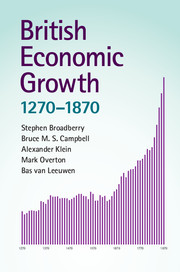Book contents
- Frontmatter
- Contents
- List of Tables
- List of Figures
- List of Appendices
- Preface and acknowledgements
- List of Weights, measures and money
- Prologue: Historical national income accounting
- Part I Measuring economic growth
- Part II Analysing economic growth
- 6 Real wage rates and GDP per head
- 7 Consumption
- 8 The social distribution of income
- 9 Labour productivity
- 10 Britain in an international context
- 11 Epilogue: British economic growth, 1270–1870
- Bibliography
- Index
9 - Labour productivity
Published online by Cambridge University Press: 05 January 2015
- Frontmatter
- Contents
- List of Tables
- List of Figures
- List of Appendices
- Preface and acknowledgements
- List of Weights, measures and money
- Prologue: Historical national income accounting
- Part I Measuring economic growth
- Part II Analysing economic growth
- 6 Real wage rates and GDP per head
- 7 Consumption
- 8 The social distribution of income
- 9 Labour productivity
- 10 Britain in an international context
- 11 Epilogue: British economic growth, 1270–1870
- Bibliography
- Index
Summary
Introduction
England’s aggregate output per head doubled between the 1290s and the 1690s, trebled by the 1800s and had quadrupled by the 1850s: self-evidently, the productivity of labour was rising across this long period. Whether it was rising equally across all three sectors is another matter. Deane and Cole’s (1967) once influential account of British economic development since 1688 was premised on an eighteenth-century agricultural revolution releasing labour to industry at the very time that mechanisation and the division of labour were raising the productivity of labour in manufacturing. British-made goods thereby became unbeatable in world markets so that industry became the most dynamic employment sector within a fast-growing economy. Yet evidence of agricultural innovation a century earlier (Kerridge, 1967) suggested that agricultural output and probably labour productivity were rising from the seventeenth century, so that the share of the labour-force in agriculture was already much reduced before the industrial revolution got under way. Initially controversial, this view has since gained considerable legitimacy (Allen, 1992, 1999; Overton, 1996, 80–2, 121–30). Indeed, it would be difficult to account for an English urbanisation ratio which rose from 5.25 per cent in the 1520s to 17.0 per cent by 1700 and then 27.5 per cent in 1801 (Wrigley, 1985: 688) if there were no concurrent improvements in agricultural labour productivity.
The post-1700 output estimates of Crafts (1985) and Crafts and Harley (1992) accepted the revisions of the agricultural historians and, in turn, proposed that industrial growth was slower during the eighteenth century than estimated by Deane and Cole, notwithstanding the continued transfer of labour out of agriculture and into industry. On this scenario eighteenth-century agriculture was more successful at shedding labour than industry was at expanding output: hence the paradox that, at the very time that Britain was becoming the workshop rather than the granary of the world (Crafts, 1989), productivity growth in agriculture apparently exceeded that in industry.
- Type
- Chapter
- Information
- British Economic Growth, 1270–1870 , pp. 340 - 370Publisher: Cambridge University PressPrint publication year: 2015



